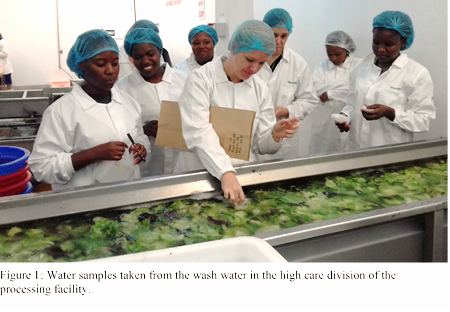|
Cycle 5 (2015 Deadline)
Characterizing and tracking of antimicrobial resistance in the water-plant-food public health interface: an emerging water, sanitation and hygiene issue
PI: Liza Korsten (Lise.korsten@up.ac.za), University of Pretoria
U.S. Partner: Manan Sharma, United States Department of Agriculture, Agricultural Research Service, Environmental Microbial and Food Safety Laboratory
Project Dates: December 2016 - November 2019
Project Overview:
The main aim of this research project is to determine the prevalence of, characterize, and track antimicrobial resistance (AR) in the water-plant-food-public health interface. This will contribute to addressing the knowledge gap on the contribution of agro-ecosystems to the dissemination of AR resistance in the environment in South Africa. Access to safe potable water is a basic human right. The microbiological quality of water sources, especially surface water, are seriously compromised by municipal wastewater discharge, sewage from informal settlements with inadequate sanitation, and wastes from animal husbandry, industrial companies, hospitals, and the mining sector. With strategic resources being polluted, consumers face increased risks with potential negative effects on human health, the environment, and food security. Following consultation with key stakeholders, the research team will select study sites where the risk for fecal bacterial contamination is high due to anthropogenic activities.
They will compare levels of antimicrobial re sistance prevalence in rural versus urban settings and organic farming versus intensive commercial farming, which should contribute towards an improved understanding of the role of agricultural practices on driving AR development in the agricultural ecosystem.
Hazard analysis coupled with pollution source tracking within a specific area will facilitate the assessment of the potential impact on public health.
The impact of this research should also provide water management services, government officials, and farmers with a knowledge base of “hotspots” where irrigation water quality has been severely compromised in South Africa. Knowledge generated during the course of the project should ultimately aid in the development of a Water and Health strategy in South Africa.
Summary of Recent Events
The main aim of the research project, which ended in December 2019, was to determine the prevalence of, characterize, and track antimicrobial resistance (AR) in the water-plant-food-public health interface to address the knowledge gap on the contribution of agro ecosystems to the dissemination of AR resistance in South Africa. The PI reports that she and her team were able to determine the prevalence, dissemination, and phenotypic and genotypic characteristics of AR in the water-plant-animal-food-public health interface. They accomplished this by means of field experiments and reviews of the literature on the levels of fecal contamination indicator bacteria, AR prevalence, and dissemination and profiles of microorganisms from the water-plant-animal-food-health interface. Sampling sites were selected in three Provinces in South Africa and included 16 commercial/small-scale farms, irrigation water, soil, fresh produce from farm to market, 10 hospitals, 7 slaughterhouses, 3 wastewater treatment facilities, 7 rivers, and several other farms not included above (5 vegetable, 4 dairy, 1 poultry, 1 cattle, 1 animal). The produce selected included lettuce, spinach, Chinese spinach, marogo, rape cabbage, spinach, cucumber, tomatoes, green beans, carrot, broccoli, and cauliflower.
The results showed that the prevalence and dissemination of multidrug resistant ESBL/Amp C Enterobacteriaceae in the aquatic/agroecosystems of South Africa exposes consumers to risks and presents a potential public health hazard. The results add to the global knowledge base regarding the prevalence and characteristics of ESBL/AmpC-producing Enterobacteriaceae in fresh vegetables and the agricultural environment required for future risk analysis in order to develop and implement risk mitigation strategies.
Based on their research results, the researchers submitted two papers to Frontiers in Microbiology for publication.
During the project, seven MSc students, three PhD students, and two postdocs were trained. New international collaboration was established via the U.S. partner, who provided access to food safety training videos. The PI also formed a collaboration with South African Government departments, resulting in her being invited to serve on a ministerial advisory committee on AR. She and her colleagues are collaborating with the Department of Health to develop science-based microbiological quality guidelines of ready-to-eat fresh produce. Lastly, the Water Research Commision (WRC) representative in South Africa, Dr. Sylvester Mpandeli, has invited the PEER team to host a workshop on the prevalence and dissemination of antimicrobial resistance in the water-plant-food-public health interface in collaboration with the WRC. He also requested them to prepare an “antimicrobial resistance knowledge gaps” document with future research requirements based on research results to date from their PEER grant.
Back to PEER Cycle 5 Grant Recipients
|
|
|
|




